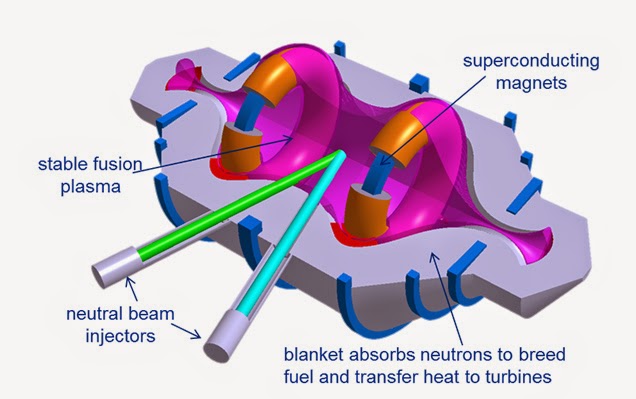sustainability
Lockheed Martin’s Claims Sustainable Fusion is Within Its Grasp

Lockheed Martin Claims Sustainable Fusion is Within Its Grasp
Skunk Works Reveals Compact Fusion Reactor Details
Lockheed Martin’s New Compact Fusion Reactor Might Change Humanity Forever
In February, Lockheed Martin’s Skunk Works team made a bold announcement: they are 5-10 years away from successfully creating and commercially selling compact fusion reactors (CFRs). These devices are conceptually safer, cleaner, and more powerful than much larger nuclear systems that rely on nuclear fission. CFRs use water for fuel, produce byproducts that are safe, and releases no air pollution. These devices are scalable, so they can be used as the power source for airplanes and space ships, for which they could fly indefinitely. A CFR that is the size of 23 x 42 feet could produce enough energy to power a large cargo ship or an 80,000-home city. If Lockheed Martin can actually make this work, then, as so many people are saying, it will be a revolutionary and transformative step for humanity.
It’s clear that such a device would be a huge disruptive innovation. To create a cheap, portable, more powerful, safe and clean energy source would significantly affect several industries, especially the energy, oil and gas, and environmental industries. I think would be several types of disruptive innovations, including low-end, sustaining, and new-market innovation. This would be a low-end innovation because using a CFR would be cheaper than using, say, oil and gas for your primary energy source. It would also reduce the risk of catastrophic nuclear disasters (think Fukushima). This would be a new-market innovation because, well, a fusion reactor has never been created before. It may be performing the same function as other energy sources, but it will create new industries around it. And it will be a sustaining innovation for the reason mentioned earlier: it’s performing the same function of generating energy.
What do you guys think about these Lockheed Martin’s announcement? Is it as revolutionary as they purport it to be, or is it overhyped? Do you think it would be a major disruptive innovator, or might it lose out to legal opposition from the current energy and oil and gas industries? What other industries do you think would be affected by this technology? Let me know what you think!
Unsustainable Business Models: They Skip the “Search” Phase
In this blog post on Strategyzer, Nabila Amarsy outlines the 3 essential requirements to make a business venture successful:
- The Right Value Proposition
- The Right Business Model
- Flawless Execution
This might seem like common sense, but Amarsy goes on to define what she calls the “search” phase of developing a business idea and how its absence lies at the root of many unsuccessful business ventures. The “search” phase takes place in conjunction with the first 2 requirements outlined above, and basically means “producing market evidence that an idea is going to work”. This phase can be viewed as a loop (refer to the picture above) that occurs until enough research, prototyping, and testing has been done to conclude that the idea will work. Skipping the “search” phase is referred to as premature scaling, and Amarsy claims it can kill any business. Flawless execution can then only be successfully achieved after appropriately exiting the “search” phase.
What do you guys think about this? Should Christenson (and others) have included this in his article “Reinventing the Business Model”? Do you think many people just assume their idea is great because they themselves (and maybe a select inner grouping of people) think so? And what of the companies that skip this phase but are still successful (such as large corporations that invest heavily in R&D, which Amarsy points out is not synonymous with “searching”)? Are they just lucky? And how much time should be invested into the “search” phase? Finally, this idea is very appropriate for our capstone project. How many teams think they successfully conducted a “search” phase that enabled them to conclude their idea was worth pursuing?
————————————————————————————————————————————————————
“We’re a classic MBA case study in how not to introduce a product. First we created a marvelous technological achievement. Then we asked how to make money on it.”
–Iridium Interim CEO John A. Richardson, August 1999
ADTRAN, INC example of an “IT as Engine Room” organization
ADTRAN _ Reinventing the Network
I found this press release on a company that related to our class discussion from the other day. ADTRAN, INC. is a leading global provider of networking and communications equipment. It is reinventing the network with its industry-leading solutions that enable voice, data, video and Internet communcaition across a variety of network infrastructure allowing its customers to evolve, change, and grow.
Which of the four models do you feel this company falls under in regards to its enterprise focus? Why?
I feel this company falls under “IT as Engine Room.” Furthermore, when I was reading this press release I started thinking of something more personal. Financial management practices are not just for companies, so even though our class discussion was focused on financial management practices within a company. I wanted to step outside from that and talk about starting to invest in our futures past school. Being seniors and MIS majors I feel that we should be analyzing the market place we will be joining for knowledge, and investment opportunities. For the most part we are on our own when it comes to our retirement options. There will most likely be no social security for us from the government, and the companies we choose to pursue careers with won’t have much more to offer other then a 401-k. As young adults you might think it is to early to be thinking/planning for retirement, but for us it is not. So my questions to everyone would be:
What financial management practices/strategies could we pursue to ensure we are creating a sustainable future/retirement plan for ourselves so that we can too evolve, change, and grow? Ex: IRS’s, stock market, commodity markets, etc. Also, if you have this set in place for yourself already maybe you could share some of your practices with the class.



